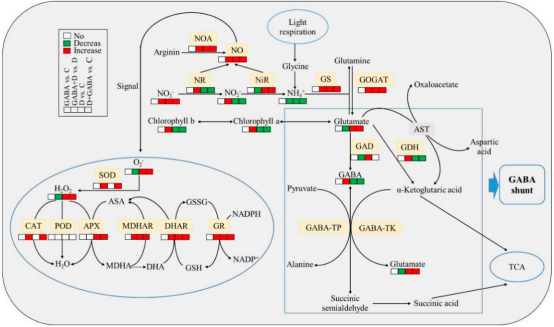Nitric oxide signal, nitrogen metabolism, and water balance affected by γ-aminobutyric acid (GABA) in relation to enhanced tolerance to water stress in creeping bentgrass
2022年03月11日 16:06
DOI:10.3390/ijms21207460
Mingyan Tang, Zhou Li, Ling Luo, Bizhen Cheng, Youzhi Zhang, Weihang Zeng, Yan Peng
发表期刊:International Journal of Molecular Sciences
链接:https://www.researchgate.net/publication/346205775_Nitric_Oxide_Signal_Nitrogen_Metabolism_and_Water_Balance_Affected_by_g-Aminobutyric_Acid_GABA_in_Relation_to_Enhanced_Tolerance_to_Water_Stress_in_Creeping_Bentgrass
Abstract:
γ-Aminobutyric acid (GABA) plays an important role in regulating stress tolerance in plants. Purposes of this study was to determine the effect of an exogenous supply of GABA on tolerance to water stress in creeping bentgrass (Agrostis stolonifera), and further reveal the GABA-induced key mechanisms related to water balance, nitrogen (N) metabolism and nitric oxide (NO) production in response to water stress. Plants were pretreated with or without 0.5 mM GABA solution in the roots for 3 days, and then subjected to water stress induced by -0.52 MPa polyethylene glycol 6000 for 12 days. The results showed that water stress caused leaf water deficit, chlorophyll (Chl) loss, oxidative damage (increases in superoxide anion, hydrogen peroxide, malondialdehyde, and protein carbonyl content), N insufficiency, and metabolic disturbance. However, the exogenous addition of GABA significantly increased endogenous GABA content, osmotic adjustment and antioxidant enzyme activities (superoxide dismutase, catalase, dehydroascorbate reductase, glutathione reductase and monodehydroascorbate reductase), followed by effectively alleviating water stress damage, including declines in oxidative damage, photoinhibition, and water and Chl loss. GABA supply not only provided more available N, but also affected N metabolism through activating nitrite reductase and glutamine synthetase activities under water stress. The supply of GABA did not increase glutamate content and glutamate decarboxylase activity, but enhanced glutamate dehydrogenase activity, which might indicate that GABA promoted the conversion and utilization of glutamate for maintaining Chl synthesis and tricarboxylic acid cycle when creeping bentgrass underwent water stress. In addition, GABA-induced NO production, depending on nitrate reductase and NO-associated protein pathways, could be associated with the enhancement of antioxidant defense. Current findings reveal the critical role of GABA in regulating signal transduction and metabolic homeostasis in plants under water-limited condition.
